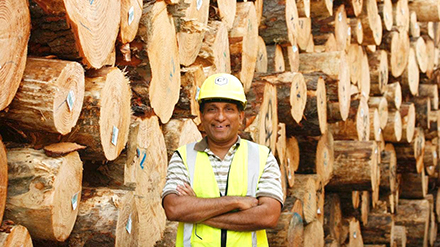A forestry company barred from harvesting is considering leaving Marlborough after ending a court battle. Zindia Limited was stopped from processing its block in the Queen Charlotte Sound after the Marlborough District Council issued a cease-and-desist notice, saying it breached its resource consents. Source: Timberbiz
The Environment Court overturned the council’s orders, finding harvesting was allowed, but the notice was restored after the High Court ruled the Environment Court had “erred in its interpretation”.
The company took its case to the Court of Appeal, which agreed in June to hear it, but the company later withdrew its application. Zindia Limited’s managing director Jacob Mannothra said it could be time for the company to “bid goodbye” to Marlborough.
“We’ll probably look at going overseas, because it’s too hard here. No-one sticks together … There’s just no support,” Mr Mannothra said.
“The [Court of Appeal] application was costing us thousands in legal fees … It’s better to cut our losses. It’s a pity, but that’s how it is.”
Mannothra said the company’s footprint was “quite large”, employing about 250 people each time it shipped logs from Marlborough.
Council advocacy and practice integration manager Barbara Mead said by discontinuing the application, Zindia had accepted the High Court’s decision, which concluded it needed a harvesting consent.
“It has a wider implication for us because [the determination] … means permitted activities cannot be swept up into a resource consent and gain the protection of being a consented activity.”
The two consents at the centre of the dispute were approved by the council and included several references to forestry harvesting, including building an access way “to transport logs harvested”.
Zindia argued this was broad enough to warrant log harvesting.
But the council argued Zindia required a new resource consent under the region’s environment plan to harvest a plantation, as log harvesting had the potential to cause significant adverse effects, and those effects needed to be guarded by consent conditions.
The plantation was located close to an ecologically significant marine site, protected under the region’s new environment plan.
Justice Jan-Marie Doogue ruled in her High Court decision last October that while the consents allowed the company to prepare for commercial harvesting, they did not allow for actual harvesting.
“In my view, it is significant that the applicant … did not expressly seek permission to undertake commercial forestry harvesting – a point which I note has not been squarely addressed by Zindia.”
Council consents and compliance group manager Gina Ferguson previously said the company could continue a consent it began last February to harvest logs, which it then suspended two months later.
“A consent may be granted allowing the company to undertake forestry activity, including logging, under the appropriate conditions.”






